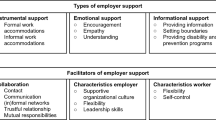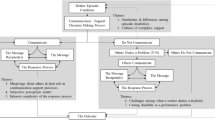Abstract
Purpose
A work disability negotiation takes place between a supervisor, the disabled employee and the occupational health service (OHS) to support the disabled employee in returning to their work, often with temporary work accommodation. The objective of this study was to define the factors of a work disability negotiation with OHS that supported or hindered supervisors in their task/role in work disability management.
Methods
The study setting comprised two parts: the creation of survey questions and the actual survey of supervisors (N = 254) from six public and private organizations in Finland. Of these, 133 (52%) had participated in one or more work disability negotiations. The responses covered about 240 work disability cases and considerably more negotiations.
Results
The study identified four key elements that the supervisors expressed as major success factors in the negotiations. First, it was crucial that the supervisors learned about the employee’s health restrictions and understood the issues relating to their work disability. Second, the parties should aim for common solutions and conclusions through collaboration. Third, active participation of all the negotiation parties is important. The supervisors gave a high rating to OHS taking their views seriously. Last, the supervisors appreciated collaboration in a constructive atmosphere.
Conclusion
In order for a negotiation to help supervisors in their challenges, it should reach solutions, conclusions and a restructured comprehension of the work disability problem in a constructive atmosphere and with active communication between stakeholders.


Similar content being viewed by others
References
Act amending the Health Insurance Act 13 §5/2010 (in Finnish) http://www.finlex.fi/fi/laki/ajantasa/2004/20041224#L13P5. Accessed Sept 2020
Act amending the Health Insurance Act 19/2012 (in Finnish). http://www.finlex.fi/fi/laki/alkup/2012/20120019?search%5Btype%5D=pika&search%5Bpika%5D=19%2F2012%20. Accessed Sept 2020
Act amending the Occupational Health Care Act 708/3013 (In Finnish). http://www.finlex.fi/fi/laki/alkup/2013/20130708. Accessed Sept 2020
Anema JR, Schellart AJ, Cassidy JD, Loisel P, Veerman TJ, van der Beek AJ (2009) Can cross country differences in return-to-work after chronic occupational back pain be explained? An exploratory analysis on disability policies in a six country cohort study. J Occup Rehabil 19(4):419–426
Carroll C, Rick J, Pilgrim H, Cameron J, Hillage J (2010) Workplace involvement improves return to work rates among employees with back pain on long-term sick leave: a systematic review of the effectiveness and cost-effectiveness of interventions. Disabil Rehabil 32(8):607–621
Cunningham C, Doody C, Blake C (2008) Managing low back pain: knowledge and attitudes of hospital managers. Occup Med (Lond) 58(4):282–288
Franche R-L, Cullen K, Clarke J, Irvin E, Sinclair S, Frank J et al (2005a) Workplace-based return-to-work interventions: a systematic review of the quantitative literature. J Occup Rehabil 15:607–631
Franche RL, Baril R, Shaw W, Nicholas M, Loisel P (2005b) Workplace-based return-to-work interventions: optimizing the role of stakeholders in implementation and research. J Occup Rehabil. 15(4):525–542 ((Review))
Gensby U, Labriola M, Irvin E, Amick BC 3rd, Lund T (2014) A classification of components of workplace disability management programs: results from a systematic review. J Occup Rehabil 24(2):220–241
Halonen JI, Solovieva S, Pentti J, Kivimäki M, Vahtera J, Viikari-Juntura E (2016) Effectiveness of legislative changes obligating notification of prolonged sickness absence and assessment of remaining work ability on return to work and work participation: a natural experiment in Finland. Occup Environ Med 73(1):42–50
Halonen JI, Atkins S, Hakulinen H, Pesonen S, Uitti J (2017) Collaboration between employers and occupational health service providers: a systematic review of key characteristics. BMC Public Health 17(1):22
Kristman VL, Shaw WS, Boot CR, Delclos GL, Sullivan MJ, Ehrhart MG, Hopkinton Conference Working Group on Workplace Disability Prevention (2016) Researching complex and multi-level workplace factors affecting disability and prolonged sickness absence. J Occup Rehabil. 26(4):399–416
Kuper A, Lingard L, Levinson W (2008) Critically appraising qualitative research. BMJ 337:a1035. https://doi.org/10.1136/bmj.a1035
Land V, Parry R, Seymour J (2017) Communication practices that encourage and constrain shared decision making in health-care encounters: systematic review of conversation analytic research. Health Expect 20(6):1228–1247. https://doi.org/10.1111/hex.12557
Lappalainen L, Liira J, Lamminpää A, Rokkanen T (2018) Work disability negotiations: supervisors’ view of work disability and collaboration with occupational health services. Disabil Rehabil. 41:1–11
Lax M (2015) Not quite a win-win: the corporate agenda of the stay at work/return to work project. New Solut 25(1):4–24
Main CJ, Shaw WS, Hopkinton Conference Working Group on Workplace Disability Prevention (2016) Employer policies and practices to manage and prevent disability: conclusion to the special issue. J Occup Rehabil 26:490–498
McGuire C, Kristman VL, Shaw WS, Loisel P, Reguly P, Williams-Whitt K, Soklaridis S (2017) Supervisors’ perceptions of organizational policies are associated with their likelihood to accommodate back-injured workers. Disabil Rehabil 39(4):346–353
Nelson CC, Shaw W, Robertson M (2016) Supervisors and presenteeism: how do supervisors accommodate and support skilled workers with chronic health concerns? Employ Respons Rights J 28:209–223
Palmer KT, Harris EC, Linaker C, Barker M, Lawrence W, Cooper C, Coggon D (2012) Effectiveness of community- and workplace-based interventions to manage musculoskeletal-related sickness absence and job loss: a systematic review. Rheumatology (Oxford) 51(2):230–242
Pransky G, Shaw W, Franche RL, Clarke A (2004) Disability prevention and communication among workers, physicians, employers, and insurers—current models and opportunities for improvement. Disabil Rehabil. 26(11):625–634 ((Review))
Ristimäki H-L, Tiitinen S, Juvonen-Posti P, Ruusuvuori J (2020) Collaborative decision-making in return-to-work negotiations. J Pragmat 170:189–205
Shaw WS, Robertson MM, Pransky G, McLellan RK (2003) Employee perspectives on the role of supervisors to prevent workplace disability after injuries. J Occup Rehabil 13(3):129–142
Shaw WS, Main CJ, Pransky G, Nicholas MK, Anema JR, Linton SJ, Hopkinton Conference Working Group on Workplace Disability Prevention (2016) Employer policies and practices to manage and prevent disability: foreword to the special issue. J Occup Rehabil. 26:394–398
Williams-Whitt K, Kristman V, Shaw WS, Soklaridis S, Reguly P (2016) A model of supervisor decision-making in the accommodation of workers with low back pain. J Occup Rehabil 26(3):366–381
Young AE, Viikari-Juntura E, Boot CR, Chan C, de Porras DG, Linton SJ, Hopkinton Conference Working Group on Workplace Disability Prevention (2016) Workplace outcomes in work-disability prevention research: a review with recommendations for future research (Review. Erratum in: J Occup Rehabil. 2017;27(2):306). J Occup Rehabil. 26(4):434–447
Author information
Authors and Affiliations
Corresponding author
Ethics declarations
Conflict of interest
The authors report no declarations of interest.
Ethical approval
The research plan was accepted by the Research Ethics Committee of the Medical Faculty of Helsinki University.
Informed consent
The participants gave their informed consent to participate in the study included in the questionnaire forms.
Additional information
Publisher's Note
Springer Nature remains neutral with regard to jurisdictional claims in published maps and institutional affiliations.
Rights and permissions
About this article
Cite this article
Lappalainen, L., Liira, J. & Lamminpää, A. Work disability negotiations between supervisors and occupational health services: factors that support supervisors in work disability management. Int Arch Occup Environ Health 94, 689–697 (2021). https://doi.org/10.1007/s00420-020-01623-5
Received:
Accepted:
Published:
Issue Date:
DOI: https://doi.org/10.1007/s00420-020-01623-5




